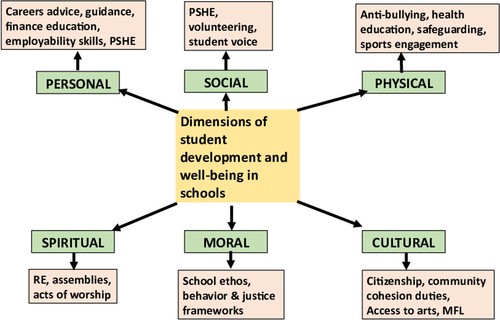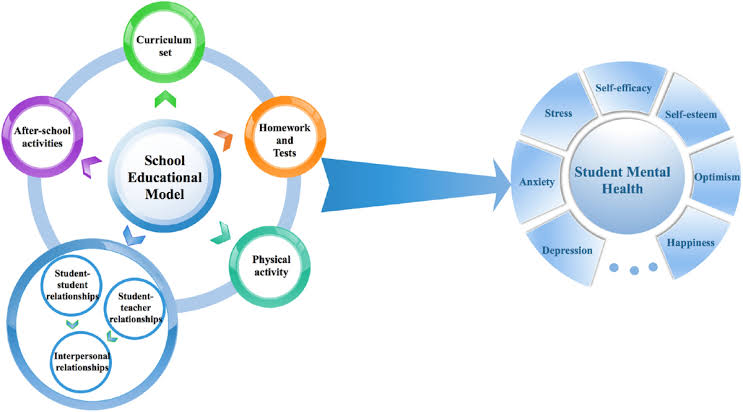Introduction
The relationship between education and mental health is increasingly recognized as fundamental to fostering both academic success and overall well-being. As students navigate the complexities of learning, social interactions, and personal development, mental health plays a crucial role in shaping their experiences and outcomes. Positive mental health enables students to engage fully in their education, enhancing their ability to learn, communicate, and form relationships. Conversely, mental health challenges can hinder academic performance, disrupt social dynamics, and lead to long-term consequences if not addressed.
In today’s fast-paced, competitive educational environment, students face various pressures from academic expectations and peer relationships to the pervasive influence of social media. These pressures can significantly impact their mental health, leading to issues such as anxiety, depression, and stress. Recognizing the interconnectedness of mental health and education is vital for creating supportive learning environments that promote resilience, emotional well-being, and academic achievement. By prioritizing mental health initiatives within educational settings, we can empower students to thrive both inside and outside the classroom, fostering a healthier, more productive future generation.
Importance of mental health in education
it directly influences students’ ability to learn, engage, and succeed academically. When students have good mental health, they are better equipped to handle stress, participate actively in classroom activities, and build positive relationships with peers and educators. Conversely, mental health challenges, such as anxiety and depression, can impede concentration, reduce motivation, and lead to absenteeism, negatively impacting academic performance.
Moreover, fostering a supportive mental health environment promotes emotional resilience, helping students navigate life’s challenges more effectively. Schools that prioritize mental health create safe spaces where students feel valued and understood, which can enhance their overall well-being and self-esteem.
Strategies to support mental health in education
Mental Health Education: Incorporating mental health awareness into the curriculum helps students understand emotional well-being and reduces stigma. Workshops and classes can teach students coping mechanisms, stress management, and the importance of seeking help.
Access to Counseling Services: Schools should provide access to trained mental health professionals who can offer counseling, support, and crisis intervention. A dedicated school counselor can make a significant difference in student’s lives by providing a safe space to discuss their feelings.
Mindfulness and Relaxation Techniques: Introducing mindfulness practices, like meditation and yoga can help students manage anxiety and improve focus. Regular sessions can promote emotional regulation and resilience.
Parental Involvement: Engaging parents in mental health initiatives can strengthen support systems for students. Workshops and resources for parents can empower them to recognize signs of mental health issues and provide appropriate support.
The role of educator
Educators play a crucial role in supporting students’ mental health by fostering a safe and inclusive classroom environment. They can identify signs of mental health issues and encourage open communication, allowing students to express their feelings. Educators help students develop essential coping skills and resilience by integrating social-emotional learning into the curriculum.
Additionally, teachers can collaborate with mental health professionals to provide resources and support. Building strong relationships with students fosters trust and encourages them to seek help when needed. Ultimately, educators are key Advocates for mental well-being, promoting a holistic approach to education that benefits academic and emotional development.
Mental Health and its Relationship To Wellbeing
At the center of the argument in this paper is the relationship between what is meant by mental health and wellbeing in its UK use. The terms ‘mental health’ and ‘wellbeing’ are often used together, but without explaining their relationship (Ereaut & Whiting, 2008). For example, a well-known UK mental health voluntary organization refers to CYP’s ‘mental health and well-being’ without details about their relationship (Young Minds, 2020). Another voluntary organization focussing on ‘mentally healthy schools’ explains that:
your mental health affects how you feel, think, and act. It refers to your emotional, psychological, and social well-being. (Mentally Healthy Schools, 2020)
Just as it’s important to look after your physical health, the same is true for your mental health. Your state of well-being affects how you cope with stress, relate to others, make choices, and play a part in your family, community, workplace, and among your friends.

It is clear that mental health is being aligned with well-being – mental health as well-being – which is differentiated into emotional, psychological, and social forms. Various consequences are then attributed to mental health as well-being, such as social-emotional development and academic attainments. This mental health as well-being concept is the one proposed by the World Health Organization (WHO) when it states that mental health is a state of well-being in which:
- The individual realizes his or her own abilities
- Can cope with the normal stresses of life
- Can work productively and fruitfully
- Is able to make a contribution to his or her community.
The WHO applies this concept of mental health to children by emphasizing a developmental view about enabling full active participation in society, in these terms:
- Having a positive sense of identity,
- Ability to manage thoughts, emotions,
- Build social relationships, and
- Aptitude to learn and to acquire an education.
In this conception mental health is not just the absence of mental health disorders, difficulties or conditions, it has a positive meaning in terms of well-being. This has been referred to as positive mental health as distinct from negative mental health, which is also sometimes referred to as mental unwellness, mental illness, or psychiatric or mental disorder (Schonfeld et al., 2017). This is the idea of a mental health spectrum which ranges from mentally healthy at one end through coping and struggling to being unwell or mentally ill/having a mental disorder at the other end.
Mental Health of Children and School-Specific Effects
Findings from epidemiological studies of high-income countries show a point prevalence of 8–18% for psychiatric disorders in school-age children, although many more children will have lower but still impairing levels of psychological distress.5 Childhood psychiatric disorders are associated with educational failure,6 which in turn is associated with increased rates of psychiatric disorders7 and both are associated with a range of additional adverse outcomes, including risk-taking behavior and being more likely to enter the criminal justice system.8–11 Children who are struggling with psychological symptoms do not form a discrete group; therefore, effective mental health interventions could improve outcomes for all children, not only those with clinically significant psychiatric morbidity, which underscores the potential benefits of universal interventions.
The prevalence of psychiatric disorders varies with age.5 The most common difficulties in school-age children are disruptive behavior and anxiety disorders. Separation anxiety and oppositional defiant disorder are seen mainly in primary school children (aged 4–10 years), whereas generalized anxiety, conduct disorder, and depression are more common in secondary school students (aged 11–18 years). Attention deficit hyperactivity disorder (ADHD) and autism spectrum disorders pose particular difficulties for children in the school environment, and the incidence of eating disorders and psychosis starts to increase rapidly from mid-adolescence onwards.

Some school-specific factors are related to mental health during childhood. Bullying often takes place within the school context; a UK survey17 showed that 46% of school-aged children had been bullied. The odds of suicidal ideation and suicidal attempts are more than doubled in young people who report peer victimization. Bullying can affect children into adulthood with increases in the prevalence of anxiety, depression, and self-harm.
Conclusion
Supporting mental health in education is essential to creating a balanced and productive learning environment that fosters academic success and personal growth. By integrating mental health programming into the educational environment through mental health education, accessible counseling, mindfulness interventions, parental involvement, and the active role of teachers we empower students to cope, to manage deal with stress, and thrive. Making mental well-being a priority in schools not only enhances students’ academic performance but also prepares them for the challenges of life beyond the classroom Embracing this holistic approach provides a future for a healthy, resilient generation.
You may also like to read: Mental Health: Best tips to improve mental health

